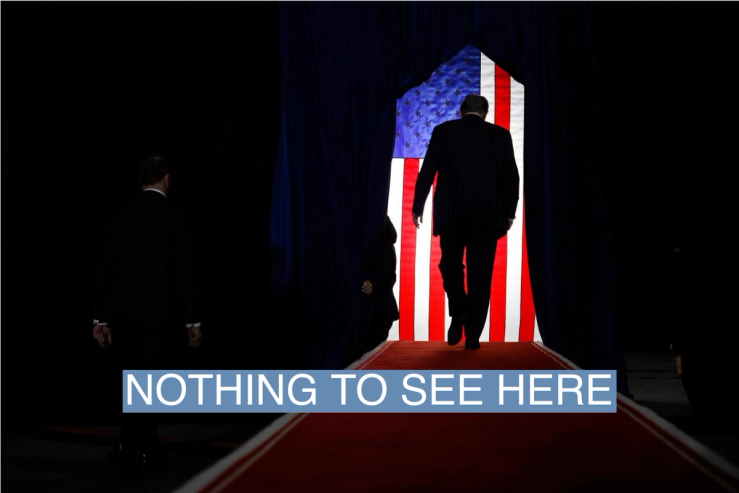The News
For one week every four years, the DoubleTree hotel in downtown Manchester, New Hampshire, an unprepossessing red brick structure with 250 rooms and a view of Veterans Memorial Park, transforms itself into the bustling nerve center of the American news media.
Rooms at the hotel that would normally go for around $100 a night run more than $700 and sell out months in advance. Big broadcasters jockey for conference room space, where they dispatch special coverage units to build entire TV sets. The gray carpeted downstairs lobby bar extends its hours until 1 am to serve the famous broadcasters, hardened political writers, and fresh-faced embeds alike running up tabs on company credit cards.
But this year, at 9:30 pm just five days before the primary, when I dropped in to see if any familiar faces were hanging around, it looked like this.

The 2024 presidential primary was supposed to lure audiences back to news after several years of flagging interest in following Donald Trump’s eventful departure from office. News outlets prepared accordingly: NBC brought in a new face for its flagship political show Meet The Press, CNN leadership debuted a new primetime evening lineup with the assumption that they’d need heavy-hitting campaign coverage.
Trump fulfilled his duties, roaring back at full force with rallies in front of thousands of rapt supporters and deploying his time-honored campaign tactics, which largely center on bullying his opponents. But even though he appears poised to potentially lock up the nomination this week on a bombastic campaign laced with the kind of once-shocking remarks that used to spur highly-rated days-long news cycles, the evidence continues to show one thing: many fewer people care.
Traffic to political coverage on digital news sites is down compared to the 2020 and 2016 presidential primaries. Television ratings for the Iowa caucuses were terrible: CNN averaged 688K total viewers with 194K in the 25-54 demo sought by advertisers in the primetime hours of 8 to 11 pm, while MSNBC averaged 1.15 million total viewers, with 143K in the demo. Fox couldn’t crack 2.8 million viewers, with 402K in the demo. In 2020, Fox News drew 4.4 million viewers overall, while 1.8 million people tuned into CNN and 2.5 million watched MSNBC. That was down 17% across the board from 2016 Iowa caucus viewership. By comparison, the NFL wild card game between the Tampa Bay Buccaneers and Philadelphia Eagles the same night drew 28.62 million viewers.
It was a little-kept secret of Trump’s rise that, even as he attacked American media and was treated by them as a threat to democracy, he rescued their advertising and subscription businesses. As CBS Chairman Les Moonves notoriously quipped to investors in February of 2016, “It may not be good for America, but it’s damn good for CBS.”
Media executives are beginning to reckon with the reality that the 2024 race won’t bring a “Trump bump” to save ad budgets or bring back readers, listeners, and viewers. In a public interview at Davos last week, the new Washington Post CEO, Will Lewis said the publication that boomed during the first Trump era will now be looking for subscribers elsewhere.
“I’m not convinced that will be the case,” Lewis said of predictions of another “Trump bump.”
In this article:
Max’s view
News consumers are smart, and have internalized a reality that many in the political class are still reluctant to acknowledge: That the options on the ballot in November will, barring some extreme event, be Trump and Biden once again. Recent polls show South Carolina Gov. Nikki Haley is within striking distance of Trump in New Hampshire, which could theoretically give her a boost as Republican primary voters consider her a more serious possibility headed into South Carolina. But the electoral path remains extremely narrow.
That’s left the national news media, which is constructed around the four-year election cycles, with not a lot to do on the campaign trail. I bumped into a well-known reporter at a Trump rally in Concord, New Hampshire on Friday who compared himself to an on-air sports commentator filling airtime when a football team is up by 30 points. Trudging through the snow en route Ron DeSantis’ sparsely-attended town hall in Hampton, New Hampshire on Wednesday days before the Florida governor called it quits, another reporter covering their sixth New Hampshire primary described this year’s as “just a bummer.” I texted a national reporter who has broken some major stories on the 2024 primary asking if they’d be in town this week. “I am not,” they replied. “What’s the point?”
At campaign events, Trump is still the primary focus of coverage — and the fact that he’s winning so handily makes asking candidates about policy and strategy feel somewhat irrelevant. So trailing around Nikki Haley this week, most of the questions she got from political reporters were, as they were for Republican rivals in 2016, about Trump: her chances of beating him, her response to his insults and racist dog whistles about her. At DeSantis’ town hall on Wednesday in Hampton, one of the Florida governor’s campaign surrogates, Rep. Thomas Massie, performed an impression of Trump that was intended to get laughs but was greeted with a few muted chuckles and uncomfortable silence.
Trump, too, has reached the campaign equivalent of an aging rock band touring on a new album: He’ll try some new stuff, but largely just plays the hits the crowd came to see. A Trump rally on Friday in Concord had all the hallmarks of any event he’s held over the last 8 years: A bit of roasting of his remaining, hopeless Republican opponents. Some complaints about the “Russia hoax,” and a reading of the song “The Snake,” the ionic crowd-pleaser of his 2016 run. Casual invocation of the use of the death penalty for convicted drug dealers. A fan chanting “Build the Wall,” a short “Lock Her Up” chant from the crowd (this time directed at Vice President Kamala Harris). If you cut the 2020 election denialism part of his set and the complaints about his legal woes, you might not know about what year it is.
Trump’s opponents also demonstrate a distinct lack of interest in giving fodder to the media which they blame in part for the primary’s failure to launch. DeSantis held no events over the weekend before abruptly dropping out. On Thursday, Nikki Haley began a campaign event 10 minutes early and left three minutes after it was scheduled to begin, as some reporters were still arriving. She had no other events on the schedule until a town hall on CNN later that evening. ABC News and CNN were both forced to cancel moderately anticipated presidential debates after the former South Carolina governor opted not to participate in them without Trump. The sole beneficiary of the vacant home stretch was Dean Philips, the longshot Democratic challenger to Joe Biden, who drew a bit of media attention at his campaign events this week because many national reporters were milling around Manchester with nothing else to do.
Some media organizations have accepted the inevitable. CBS News planned to host a debate in February in Las Vegas, but decided in the fall to pull the plug before they had to commit to expensive logistics, fearing — accurately — the current reality on the ground. Its event canceled and millions of dollars wasted, ABC News packed up its special events crew and sent many of them home early. When Boston Globe reporter James Pindell checked on Thursday, he found that there were rooms available in the DoubleTree.
The irony is particularly sharp for President Joe Biden. In 2020, he campaigned on the message that if he were elected, Americans wouldn’t need to pay attention to the drama coming out of the White House. That’s a promise on which he delivered, as he’s proven unable to focus the country’s attention on the story he’s trying to tell, or even on the threat to democracy he believes his opponent poses.
And now that strategy is somewhat reversed: The Biden campaign believes that now it’s their responsibility to keep the focus on Trump and make voters pay attention to his inflammatory statements and actions on the campaign trail. The campaign plans to put its massive warchest to work on ads designed to draw attention back to the news.
But it’s a long time until the national party conventions in July and August which usually mark the beginning of the general election. With the bar looking deserted on Thursday night at the DoubleTree, I was still looking for something to do, and had heard that outlets like NBC News and others had set up shop in the Armory, a large conference room area attached to the hotel. But when I went to see if anyone was around, the doors were closed and lights were off. I asked a hotel employee if I’d made a wrong turn, or if there was another way to get to the room.
“I locked up,” he said. “No one was using it.”
Notable
- Haley’s Wednesday night events, one of the more impressive showings, had 275 people in attendance. The Boston Globe noted that Elizabeth Warren’s dying 2020 campaign still managed to muster hundreds more people during her 2020 stops in New Hampshire.


